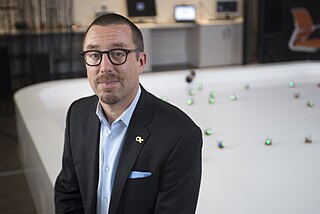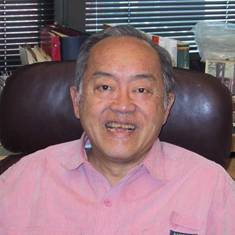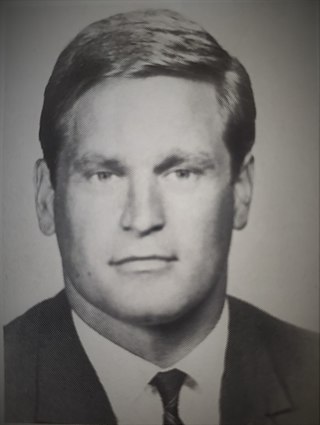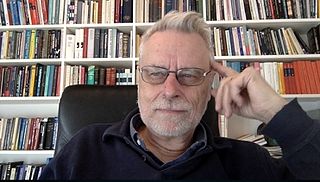Thomas Kailath is an Indian born American electrical engineer, information theorist, control engineer, entrepreneur and the Hitachi America Professor of Engineering emeritus at Stanford University. Professor Kailath has authored several books, including the well-known book Linear Systems, which ranks as one of the most referenced books in the field of linear systems.

Eduardo Daniel Sontag is an Argentine-American mathematician, and distinguished university professor at Northeastern University, who works in the fields control theory, dynamical systems, systems molecular biology, cancer and immunology, theoretical computer science, neural networks, and computational biology.
Claire Jennifer Tomlin is a British researcher in hybrid systems, distributed and decentralized optimization and control theory and holds the Charles A. Desoer Chair at the University of California, at Berkeley.

Magnus B. Egerstedt is a Swedish-American roboticist who is the Dean of the Henry Samueli School of Engineering at the University of California, Irvine. He was formerly the Steve C. Chaddick School Chair and Professor at the School of Electrical and Computer Engineering, Georgia Institute of Technology.

Yu-Chi "Larry" Ho is a Chinese-American mathematician, control theorist, and a professor at the School of Engineering and Applied Sciences, Harvard University.
Kumpati S. Narendra is an American control theorist, who currently holds the Harold W. Cheel Professorship of Electrical Engineering at Yale University. He received the Richard E. Bellman Control Heritage Award in 2003. He is noted "for pioneering contributions to stability theory, adaptive and learning systems theory". He is also well recognized for his research work towards learning including Neural Networks and Learning Automata.
Michael Athans was a Greek-American control theorist and a Professor Emeritus in the Department of Electrical Engineering and Computer Science at the Massachusetts Institute of Technology. He was a Fellow of the IEEE (1973) and a Fellow of the AAAS (1977). He was the recipient of numerous awards for his contributions in the field of control theory. A pioneer in the field of control theory, he helped shape modern control theory and spearheaded the field of multivariable control system design and the field of robust control. Athans was a member of the technical staff at Lincoln Laboratory from 1961 to 1964, and a Department of Electrical Engineering and Computer Science faculty member from 1964 to 1998. Upon retirement, Athans moved to Lisbon, Portugal, where he was an Invited Research Professor in the Institute for Systems and Robotics, Instituto Superior Técnico where he received a honoris causa doctorate from the Universidade Técnica de Lisboa in 2011.

Jakob Stoustrup is a Danish researcher employed at Aalborg University, where he serves as professor of control theory at the Department of Electronic Systems.

Dimitri Panteli Bertsekas is an applied mathematician, electrical engineer, and computer scientist, a McAfee Professor at the Department of Electrical Engineering and Computer Science in School of Engineering at the Massachusetts Institute of Technology (MIT), Cambridge, Massachusetts, and also a Fulton Professor of Computational Decision Making at Arizona State University, Tempe.

Dragoslav D. Šiljak is professor emeritus of Electrical Engineering at Santa Clara University, where he held the title of Benjamin and Mae Swig University Professor. He is best known for developing the mathematical theory and methods for control of complex dynamic systems characterized by large-scale, information structure constraints and uncertainty.

Anders Gunnar Lindquist is a Swedish applied mathematician and control theorist. He has made contributions to the theory of partial realization, stochastic modeling, estimation and control, and moment problems in systems and control. In particular, he is known for the discovery of the fast filtering algorithms for (discrete-time) Kalman filtering in the early 1970s, and his seminal work on the separation principle of stochastic optimal control and, in collaborations with Giorgio Picci, the Geometric Theory for Stochastic Realization. Together with late Christopher I. Byrnes and Tryphon T. Georgiou, he is one of the founder of the so-called Byrnes-Georgiou-Lindquist school. They pioneered a new moment-based approach for the solution of control and estimation problems with complexity constraints.
Terrence L. Fine was an American scientist, engineer and philosopher. He is known especially for his contributions to the defense and development of alternatives to the classical calculus for probabilistic modeling and decision-making. Other contributions include Fine's theorem, the Fine numbers and the Fine–McMillan quantizer. He was the recipient of the first patent awarded in the area of statistical delta modulation.

Harold Vincent Poor FRS FREng is the Michael Henry Strater University Professor of Electrical Engineering at Princeton University, where he is also the Interim Dean of the School of Engineering and Applied Science. He is a specialist in wireless telecommunications, signal processing and information theory. He has received many honorary degrees and election to national academies. He was also President of IEEE Information Theory Society (1990). He is on the board of directors of the IEEE Foundation.

Stephen P. Boyd is an American professor and control theorist. He is the Samsung Professor of Engineering, Professor in Electrical Engineering, and professor by courtesy in Computer Science and Management Science & Engineering at Stanford University. He is also affiliated with Stanford's Institute for Computational and Mathematical Engineering (ICME).
Nancy Marie Amato is an American computer scientist noted for her research on the algorithmic foundations of motion planning, computational biology, computational geometry and parallel computing. Amato is the Abel Bliss Professor of Engineering and Head of the Department of Computer Science at the University of Illinois at Urbana-Champaign. Amato is noted for her leadership in broadening participation in computing, and is currently a member of the steering committee of CRA-WP, of which she has been a member of the board since 2000.

Bruce Edward Hajek is a Professor in the Coordinated Science Laboratory, the head of the Department of Electrical and Computer Engineering, and the Leonard C. and Mary Lou Hoeft Chair in Engineering at the University of Illinois Urbana–Champaign. He does research in communication networking, auction theory, stochastic analysis, combinatorial optimization, machine learning, information theory, and bioinformatics.
Vivek Shripad Borkar is an Indian electrical engineer, mathematician and an Institute chair professor at the Indian Institute of Technology, Mumbai. He is known for introducing analytical paradigm in stochastic optimal control processes and is an elected fellow of all the three major Indian science academies viz. the Indian Academy of Sciences, Indian National Science Academy and the National Academy of Sciences, India. He also holds elected fellowships of The World Academy of Sciences, Institute of Electrical and Electronics Engineers, Indian National Academy of Engineering and the American Mathematical Society. The Council of Scientific and Industrial Research, the apex agency of the Government of India for scientific research, awarded him the Shanti Swarup Bhatnagar Prize for Science and Technology, one of the highest Indian science awards for his contributions to Engineering Sciences in 1992. He received the TWAS Prize of the World Academy of Sciences in 2009.

René Vidal is a Chilean electrical engineer and computer scientist who is known for his research in machine learning, computer vision, medical image computing, robotics, and control theory. He is the Herschel L. Seder Professor of the Johns Hopkins Department of Biomedical Engineering, and the founding director of the Mathematical Institute for Data Science (MINDS).
Venkataramanan "Ragu" Balakrishnan is an Indian–American engineer. He is the Charles H. Phipps Dean at the Case School of Engineering, having previously served as the Michael and Katherine Birck Head Professor of Electrical and Computer Engineering at Purdue University. In 2012, Balakrishnan was named a Fellow of the Institute of Electrical and Electronics Engineers (IEEE) for his contributions to convex optimization in control systems.

Munther A. Dahleh is the William Coolidge Professor of electrical engineering and computer science and director of the Massachusetts Institute of Technology (MIT) Institute for Data, Systems, and Society (IDSS).











